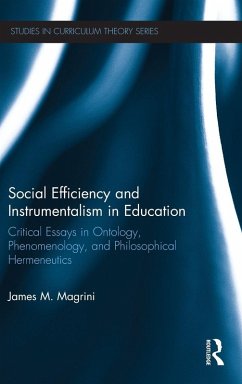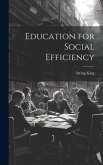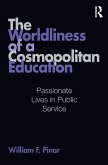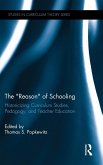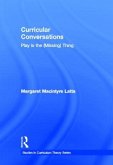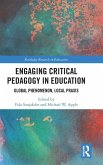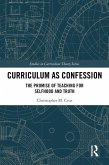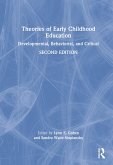James M Magrini
Social Efficiency and Instrumentalism in Education
Critical Essays in Ontology, Phenomenology, and Philosophical Hermeneutics
James M Magrini
Social Efficiency and Instrumentalism in Education
Critical Essays in Ontology, Phenomenology, and Philosophical Hermeneutics
- Gebundenes Buch
- Merkliste
- Auf die Merkliste
- Bewerten Bewerten
- Teilen
- Produkt teilen
- Produkterinnerung
- Produkterinnerung
Distinct among contemporary philosophical studies focused on education, this book engages the history of phenomenological thought as it moves from philosophy proper (the European phenomenological-hermeneutic tradition) through curriculum studies.
Andere Kunden interessierten sich auch für
![Education for Social Efficiency Education for Social Efficiency]() Irving KingEducation for Social Efficiency36,99 €
Irving KingEducation for Social Efficiency36,99 €![The Worldliness of a Cosmopolitan Education The Worldliness of a Cosmopolitan Education]() William F PinarThe Worldliness of a Cosmopolitan Education170,99 €
William F PinarThe Worldliness of a Cosmopolitan Education170,99 €![The Reason of Schooling The Reason of Schooling]() The Reason of Schooling229,99 €
The Reason of Schooling229,99 €![Curricular Conversations Curricular Conversations]() Margaret Macintyre LattaCurricular Conversations179,99 €
Margaret Macintyre LattaCurricular Conversations179,99 €![Engaging Critical Pedagogy in Education Engaging Critical Pedagogy in Education]() Engaging Critical Pedagogy in Education176,99 €
Engaging Critical Pedagogy in Education176,99 €![Curriculum as Confession Curriculum as Confession]() Christopher M CruzCurriculum as Confession179,99 €
Christopher M CruzCurriculum as Confession179,99 €![Theories of Early Childhood Education Theories of Early Childhood Education]() Theories of Early Childhood Education165,99 €
Theories of Early Childhood Education165,99 €-
-
-
Distinct among contemporary philosophical studies focused on education, this book engages the history of phenomenological thought as it moves from philosophy proper (the European phenomenological-hermeneutic tradition) through curriculum studies.
Hinweis: Dieser Artikel kann nur an eine deutsche Lieferadresse ausgeliefert werden.
Hinweis: Dieser Artikel kann nur an eine deutsche Lieferadresse ausgeliefert werden.
Produktdetails
- Produktdetails
- Verlag: Taylor & Francis
- Seitenzahl: 202
- Erscheinungstermin: 28. April 2014
- Englisch
- Abmessung: 231mm x 155mm x 15mm
- Gewicht: 399g
- ISBN-13: 9780415744003
- ISBN-10: 0415744008
- Artikelnr.: 40030066
- Herstellerkennzeichnung
- Libri GmbH
- Europaallee 1
- 36244 Bad Hersfeld
- gpsr@libri.de
- Verlag: Taylor & Francis
- Seitenzahl: 202
- Erscheinungstermin: 28. April 2014
- Englisch
- Abmessung: 231mm x 155mm x 15mm
- Gewicht: 399g
- ISBN-13: 9780415744003
- ISBN-10: 0415744008
- Artikelnr.: 40030066
- Herstellerkennzeichnung
- Libri GmbH
- Europaallee 1
- 36244 Bad Hersfeld
- gpsr@libri.de
Dr. James M. Magrini teaches Western Philosophy and Ethics at College of Dupage, USA.
Acknowledgements
Introduction:
Practicing Education-Philosophy Curriculum as Phenomenological Text and the
European Tradition in Existential-Phenomenological Philosophy
Chapter One:
The Historical Milieu of Social Efficiency Locating the Problem of the Loss
or Forgetting of Phenomenological Self-Hood
A Philosophical Overview The Influence of Positivism on Education
The Rise of Society in Education World-Alienation in Arendt's Philosophy
The Crisis of Alienation in Contemporary Education Philosophical Fall-Out
in Practice
Defining Phenomenological Self-Hood A Fundamental Ontological Vista into
Human Dasein
Chapter Two:
The Destruktion of the Language of Learning in Social Efficiency Language
and Conceptualization in Phenomenological Ontology and Original Learning
Reconceptualizing the Language of Learning
The Ontology of Original Learning as Being-Educated
Ontological Learning and the Language of "Original" Questions
Chapter Three:
Phenomenology and Curriculum Inquiry Understanding the Methods of Willis,
van Manen, and Heidegger
Setting the Historical Scene
The Phenomenology of George Willis
The Phenomenological Ontology of van Manen and Heidegger
Apologia: A Defense of Phenomenological Research
Chapter Four:
Philosophical Hermeneutics Socrates and the Ethos of Dwelling in a
Philosophical Community of Original Learning as Bildung
Human Transcendence as Hermeneutic Interpretation The Ethos of Becoming
Other in the Face of Radical Alterity
Transformation and Formation in Original Learning Bildung, Bildung Haben,
and Außerschulische Bildung
The Context of Human Dwelling as Hermeneutic Interpretation Socrates and
the Philosophical Community of Original Learners
Lingering Resonations
Chapter Five:
Huebner's Reading of Heidegger's Fundamental Ontology The Authentic
Re-Conceptualization of Learning, Historicity, and Temporality for
Contemporary Education
Huebner's Authentic View of Education Through Heidegger's Conceptual Lens
The Phenomenological Concern with Temporality and Historicity
Huebner's Heidegger Potential Implications for an Authentic Education
Transcendence, Liberation, and Emancipation
Chapter Six:
Cosmopolitanism and Curriculum in a New Key The Complicated Philosophical
Conversations of Pinar and Aoki
Cosmopolitan Curriculum as Polyphonic Discourse Orality and the Potential
for Authentic Conversation
Curriculum in a New Key Listening for the Reticent Call of Authentic
Curriculum
The Theoria-Praxis Continuum and the Space of Curriculum Theorizing
Epilogue:
Releasing our Potential-for-Being into the Indeterminate Future of
Education's Past
Introduction:
Practicing Education-Philosophy Curriculum as Phenomenological Text and the
European Tradition in Existential-Phenomenological Philosophy
Chapter One:
The Historical Milieu of Social Efficiency Locating the Problem of the Loss
or Forgetting of Phenomenological Self-Hood
A Philosophical Overview The Influence of Positivism on Education
The Rise of Society in Education World-Alienation in Arendt's Philosophy
The Crisis of Alienation in Contemporary Education Philosophical Fall-Out
in Practice
Defining Phenomenological Self-Hood A Fundamental Ontological Vista into
Human Dasein
Chapter Two:
The Destruktion of the Language of Learning in Social Efficiency Language
and Conceptualization in Phenomenological Ontology and Original Learning
Reconceptualizing the Language of Learning
The Ontology of Original Learning as Being-Educated
Ontological Learning and the Language of "Original" Questions
Chapter Three:
Phenomenology and Curriculum Inquiry Understanding the Methods of Willis,
van Manen, and Heidegger
Setting the Historical Scene
The Phenomenology of George Willis
The Phenomenological Ontology of van Manen and Heidegger
Apologia: A Defense of Phenomenological Research
Chapter Four:
Philosophical Hermeneutics Socrates and the Ethos of Dwelling in a
Philosophical Community of Original Learning as Bildung
Human Transcendence as Hermeneutic Interpretation The Ethos of Becoming
Other in the Face of Radical Alterity
Transformation and Formation in Original Learning Bildung, Bildung Haben,
and Außerschulische Bildung
The Context of Human Dwelling as Hermeneutic Interpretation Socrates and
the Philosophical Community of Original Learners
Lingering Resonations
Chapter Five:
Huebner's Reading of Heidegger's Fundamental Ontology The Authentic
Re-Conceptualization of Learning, Historicity, and Temporality for
Contemporary Education
Huebner's Authentic View of Education Through Heidegger's Conceptual Lens
The Phenomenological Concern with Temporality and Historicity
Huebner's Heidegger Potential Implications for an Authentic Education
Transcendence, Liberation, and Emancipation
Chapter Six:
Cosmopolitanism and Curriculum in a New Key The Complicated Philosophical
Conversations of Pinar and Aoki
Cosmopolitan Curriculum as Polyphonic Discourse Orality and the Potential
for Authentic Conversation
Curriculum in a New Key Listening for the Reticent Call of Authentic
Curriculum
The Theoria-Praxis Continuum and the Space of Curriculum Theorizing
Epilogue:
Releasing our Potential-for-Being into the Indeterminate Future of
Education's Past
Acknowledgements
Introduction:
Practicing Education-Philosophy Curriculum as Phenomenological Text and the
European Tradition in Existential-Phenomenological Philosophy
Chapter One:
The Historical Milieu of Social Efficiency Locating the Problem of the Loss
or Forgetting of Phenomenological Self-Hood
A Philosophical Overview The Influence of Positivism on Education
The Rise of Society in Education World-Alienation in Arendt's Philosophy
The Crisis of Alienation in Contemporary Education Philosophical Fall-Out
in Practice
Defining Phenomenological Self-Hood A Fundamental Ontological Vista into
Human Dasein
Chapter Two:
The Destruktion of the Language of Learning in Social Efficiency Language
and Conceptualization in Phenomenological Ontology and Original Learning
Reconceptualizing the Language of Learning
The Ontology of Original Learning as Being-Educated
Ontological Learning and the Language of "Original" Questions
Chapter Three:
Phenomenology and Curriculum Inquiry Understanding the Methods of Willis,
van Manen, and Heidegger
Setting the Historical Scene
The Phenomenology of George Willis
The Phenomenological Ontology of van Manen and Heidegger
Apologia: A Defense of Phenomenological Research
Chapter Four:
Philosophical Hermeneutics Socrates and the Ethos of Dwelling in a
Philosophical Community of Original Learning as Bildung
Human Transcendence as Hermeneutic Interpretation The Ethos of Becoming
Other in the Face of Radical Alterity
Transformation and Formation in Original Learning Bildung, Bildung Haben,
and Außerschulische Bildung
The Context of Human Dwelling as Hermeneutic Interpretation Socrates and
the Philosophical Community of Original Learners
Lingering Resonations
Chapter Five:
Huebner's Reading of Heidegger's Fundamental Ontology The Authentic
Re-Conceptualization of Learning, Historicity, and Temporality for
Contemporary Education
Huebner's Authentic View of Education Through Heidegger's Conceptual Lens
The Phenomenological Concern with Temporality and Historicity
Huebner's Heidegger Potential Implications for an Authentic Education
Transcendence, Liberation, and Emancipation
Chapter Six:
Cosmopolitanism and Curriculum in a New Key The Complicated Philosophical
Conversations of Pinar and Aoki
Cosmopolitan Curriculum as Polyphonic Discourse Orality and the Potential
for Authentic Conversation
Curriculum in a New Key Listening for the Reticent Call of Authentic
Curriculum
The Theoria-Praxis Continuum and the Space of Curriculum Theorizing
Epilogue:
Releasing our Potential-for-Being into the Indeterminate Future of
Education's Past
Introduction:
Practicing Education-Philosophy Curriculum as Phenomenological Text and the
European Tradition in Existential-Phenomenological Philosophy
Chapter One:
The Historical Milieu of Social Efficiency Locating the Problem of the Loss
or Forgetting of Phenomenological Self-Hood
A Philosophical Overview The Influence of Positivism on Education
The Rise of Society in Education World-Alienation in Arendt's Philosophy
The Crisis of Alienation in Contemporary Education Philosophical Fall-Out
in Practice
Defining Phenomenological Self-Hood A Fundamental Ontological Vista into
Human Dasein
Chapter Two:
The Destruktion of the Language of Learning in Social Efficiency Language
and Conceptualization in Phenomenological Ontology and Original Learning
Reconceptualizing the Language of Learning
The Ontology of Original Learning as Being-Educated
Ontological Learning and the Language of "Original" Questions
Chapter Three:
Phenomenology and Curriculum Inquiry Understanding the Methods of Willis,
van Manen, and Heidegger
Setting the Historical Scene
The Phenomenology of George Willis
The Phenomenological Ontology of van Manen and Heidegger
Apologia: A Defense of Phenomenological Research
Chapter Four:
Philosophical Hermeneutics Socrates and the Ethos of Dwelling in a
Philosophical Community of Original Learning as Bildung
Human Transcendence as Hermeneutic Interpretation The Ethos of Becoming
Other in the Face of Radical Alterity
Transformation and Formation in Original Learning Bildung, Bildung Haben,
and Außerschulische Bildung
The Context of Human Dwelling as Hermeneutic Interpretation Socrates and
the Philosophical Community of Original Learners
Lingering Resonations
Chapter Five:
Huebner's Reading of Heidegger's Fundamental Ontology The Authentic
Re-Conceptualization of Learning, Historicity, and Temporality for
Contemporary Education
Huebner's Authentic View of Education Through Heidegger's Conceptual Lens
The Phenomenological Concern with Temporality and Historicity
Huebner's Heidegger Potential Implications for an Authentic Education
Transcendence, Liberation, and Emancipation
Chapter Six:
Cosmopolitanism and Curriculum in a New Key The Complicated Philosophical
Conversations of Pinar and Aoki
Cosmopolitan Curriculum as Polyphonic Discourse Orality and the Potential
for Authentic Conversation
Curriculum in a New Key Listening for the Reticent Call of Authentic
Curriculum
The Theoria-Praxis Continuum and the Space of Curriculum Theorizing
Epilogue:
Releasing our Potential-for-Being into the Indeterminate Future of
Education's Past

